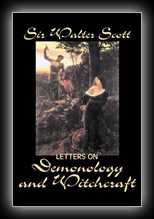
Demonology and Witchcraft - In a Series of Letters Addressed to J.G. Lockhart
by Sir Walter Scott, Bart.
1884
This work, first published in 1830 under the full title Letters on Demonology and Witchcraft, occupies a curious place in Sir Walter Scott's vast literary output. Four years after his financial collapse in 1826, the author sustained a mild stroke; shortly after, John Murray, who was then issuing a series known as The Family Library, asked Scott to contribute a volume on demonology. He readily consented, but as an entry in Scott's journal makes clear he did not greatly care for the work and really engaged in it to help pay off his debts. The book attempts to develop broad theories on such subjects as the prevalence of belief in witchcraft in the Middle Ages. Scott was far more accomplished in dealing with particular instances of occult history such as his account of demonology in France and in Sweden and his assessment of Joan of Arc. Moreover, his intimate knowledge of early Scottish literature gives a singular importance to chapters concerned with his native land, and it is interesting to find that here and there he offers something of a sidelight on his own novels (e.g., when he discusses the specters he dealt with in Woodstock). Demonology and Witchcraft is written in the form of a series of letters to the author's son-in-law. Scott died two years after publication in 1832.
Sir Walter Scott wrote Letters on Demonology and Witchcraft for Murray's Family Library (a series of books on diverse topics to be published in cheap five shilling volumes) at the request of his son-in-law, J.G. Lockhart. The books does indeed take the form of letters covering areas of demonology and witchcraft from biblical times to current day. Scott's approach to the subject is one of skepticism and rational thought -- superstitions and beliefs are often the cause of a lack of understanding of strange cultures and religions. He ends the book with an fervent hope for his countrymen that ". . . the sense of humanity is too universally spread to permit them to think of tormenting wretches till they confess what is impossible, and then burning them for their pains."
